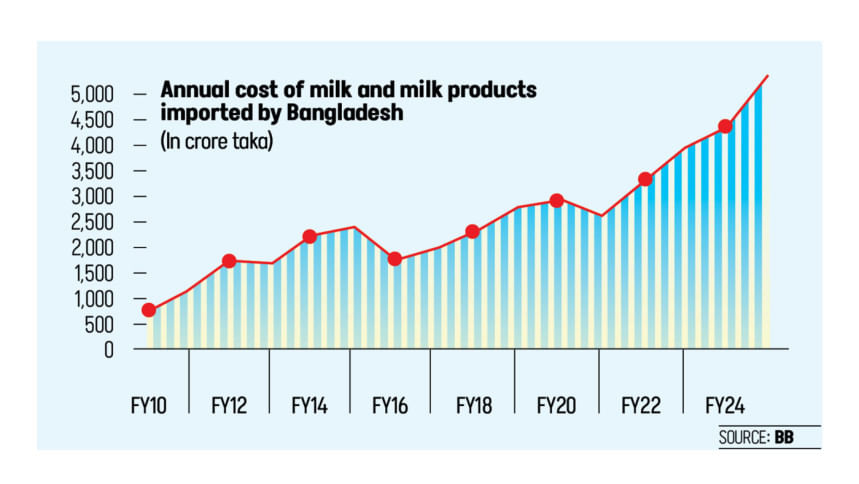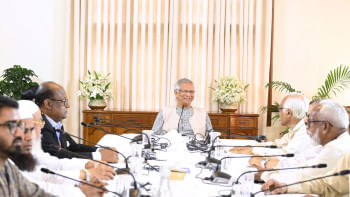After 17 years of delay, govt forms Dairy Development Board

The interim government has announced the formation of a Dairy Development Board, heeding the long-standing demand of farmers and stakeholders.
The move, announced in a gazette notification by the Ministry of Fisheries and Livestock last week, is expected to help boost domestic milk production, ensure fair prices for farmers, and reduce the nation's import dependence for nutrition.
"The gazette regarding the formation of the board has already been issued. We have now started working on the formation of the board and defining its functions," ABM Khaleduzzaman, director of production at the Department of Livestock Services (DLS), told The Daily Star.
The initiative to form a dairy board was first taken in 2008 by the then caretaker government to increase milk and dairy production nationwide and regulate standards. However, the initiative never saw the light of day for over a decade.
Later in 2023, the previous parliament passed the Bangladesh Dairy Development Board Act, paving the way for further development.
According to the law, the board will be chaired by the fisheries and livestock minister, while a state minister or deputy minister will act as the co-chairman.
It will also include one lawmaker nominated by the speaker; the fisheries and livestock secretary, who shall be the vice-chairman; the chairman of the Bangladesh Food Safety Authority; representatives from the Health Service Division, the Ministry of Agriculture, the Ministry of Commerce, the Ministry of Industries, the Rural Development and Co-operatives Division, government-nominated joint cooperative societies, commercial dairy and livestock producers; and the chiefs of the DLS and the Bangladesh Livestock Research Institute, among others.
Industry insiders and government officials have welcomed the latest move, saying the board will help organise the dairy sector, increase production, regulate quality, modernise market management, save foreign currency, create jobs, and improve nutritional security.
According to DLS Director Khaleduzzaman, the demand for milk and dairy products is rising every year, but domestic production remains relatively low, requiring Bangladesh to import large amounts of milk and milk products annually.
"Bangladesh's annual demand for milk and dairy products stands at about 162 lakh tonnes, while production is around 155 lakh tonnes. To bridge the gap, roughly $320 million worth of milk and dairy products are imported each year," he added.
In the last fiscal year, Bangladesh imported milk and milk products worth Tk 5,400 crore, seven times higher than just over Tk 700 crore of imports in FY2009-10, according to Bangladesh Bank data.
"In this context, the formation of the board is an innovative step," he said.
Khaleduzzaman said adulteration, poor quality control, weak marketing, and insufficient incentives for small farmers have held back the sector's potential. "The board could transform it into a modern, internationally standard industry, enabling self-sufficiency."
Mohammad Shah Emran, general secretary of the Bangladesh Dairy Farmers Association, lauded the development, calling it a significant milestone. "Farmers have long sought such an initiative to ensure better organisation, fair pricing, and support for smallholders."
"The board will provide an institutional framework to address long-standing challenges, modernise production, improve quality control, and promote sustainable practices," he added.
Prominent agricultural economist Jahangir Alam Khan, who was the director general of the Bangladesh Livestock Research Institute and was closely involved when the initiative was first taken in 2008, said the board's formation is crucial for food security, nutritional balance, and farmer livelihoods.
Khan stressed the need for experienced leadership familiar with livestock systems, domestic and global dairy markets, and strategies to make Bangladesh competitive.
With proper leadership and incentives, he said, self-sufficiency in the dairy sector could be achieved within five years, followed by entry into export markets, much like India's White Revolution.
He suggested offering agricultural and dairy loans at 4 percent interest, exempting income up to Tk 5 lakh from tax, and extending electricity subsidies for mechanised farms to the dairy sector.
"Our short-term goal is self-sufficiency; the long-term goal is a competitive, export-oriented dairy sector," he said.
Kamruzzaman Kamal, marketing director of Pran-RFL Group, one of the country's largest dairy producers, said the formation of the dairy board is a long-awaited move.
Similar institutions operate successfully in other countries, he said, citing India's National Dairy Board.
"Bangladesh is still a milk-deficient country, but our ambition is to transform it into a milk-surplus nation," Kamal said.
While private companies are investing, a strong government partnership will make these efforts more effective.
Moshiur Rahman, chairman of dairy producer Paragon Group, highlighted the need for a structured system that will not only reduce reliance on milk imports but also raise local milk quality, enforce hygienic practices, and modernise farming methods.
He added that the entire value chain, from on-farm practices to processing and packaging, requires proper regulation, and the board could play a vital role in ensuring this.

 For all latest news, follow The Daily Star's Google News channel.
For all latest news, follow The Daily Star's Google News channel. 



Comments